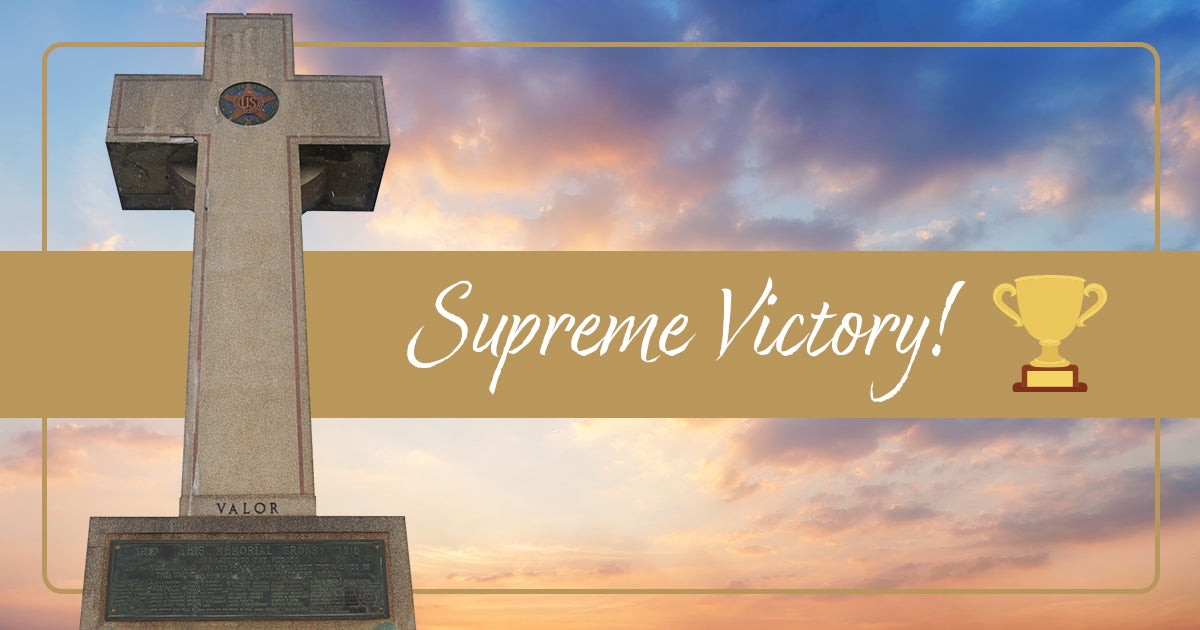
by Jorge Gomez • 4 min read
Thanks to supporters like YOU, First Liberty has won 7 Supreme Court cases in the last few years. For the month of June, we’ll bring you a special “Supreme Victory Series” to celebrate all the important wins you’ve helped us secure at the nation’s highest court.
This week, we celebrate the four-year anniversary of our landmark victory for the Bladensburg Peace Cross. On June 20, 2019, the Supreme Court’s decision in American Legion v. American Humanist Association ushered a new era for religious freedom and public religious displays.
The Bladensburg Peace Cross was built to honor 49 heroes of Prince Georges County, Maryland who died in WWI. The mothers of these men formed a committee with the purpose of building a memorial.
In September 1919, a site-dedication ceremony was held where the memorial would one day stand. But construction was delayed due to a lack of funds. In 1922, the effort was turned over to newly returned veterans of The American Legion, who agreed to take on the project as a way of honoring their fallen brothers.
The Gold Star Mothers, with the help from The Legion, inaugurated the Bladensburg Peace Cross at the terminus of the National Defense Highway in Bladensburg—a highway itself dedicated to the memory of those lost in WWI.
For over 90 years, the memorial stood as a symbol of sacrifice, and frequently served as a gathering point for veterans’ ceremonies and events. But in 2014, the American Humanist Association filed a lawsuit on behalf of an “offended observer,” claiming the memorial was unconstitutional and had to be removed. They argued the memorial was an “establishment of religion” because it was shaped like a cross and stood on government property.
We represented The American Legion in federal court for several years, arguing the Peace Cross is consistent with our nation’s history and traditions—and therefore constitutional. Lower courts ruled against it. One appellate court judge even suggested “chopping the arms” off the cross as a “solution.” Defiling or destroying the memorial was simply not an option, and we took the case all the way to the Supreme Court.
In June of 2019—100 years after the first shovel broke ground—First Liberty’s victory at the Supreme Court saved the Peace Cross from destruction. The historic 7-2 ruling upheld the memorial as constitutional and set a precedent protecting public religious displays throughout the country. It put the “Lemon” test on its deathbed, a legal standard that harmed the free exercise of religion for nearly 50 years. The decision also made an important change in constitutional law, returning to a more commonsense understanding of the First Amendment. For cases involving religious displays, the Court would apply a more constitutionally faithful “history and tradition” test.
Historic displays with religious references and imagery should be seen as “presumptively constitutional,” the Court held. That includes crosses, Ten Commandments monuments outside government buildings, nativity scenes in city parks and prayers at public meetings.
The Bladensburg victory happened four years ago, but its impact continues to be felt today.
The impact of this win is multiplied across the country whenever a religious display comes under attack. A handful of many displays protected include:
The Bladensburg Peace Cross victory brought an end to the days of offended observers forcing governments to scrub all public references to the Divine. For you, it means in your community you have the legal foundation to restore religious memorials, displays, seals and symbols—and to confidently defend them if anyone tries to tear them back down.
Winning major cases at the Supreme Court is only possible because of your support. At the end of June, we will wrap up our Fiscal Year—and we need your help to reach our yearly goal. If you give to First Liberty any time between today and June 30, your donation will have a multiplied impact thanks to a generous $300,000 Challenge Grant!
With your help, our attorneys will continue defending and delivering victories that protect religious freedom for generations to come—for our children and grandchildren. These cases are very expensive to pursue. Can we count on your support?